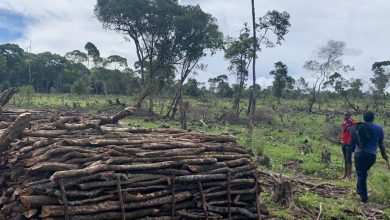Businesses that try to come clean about their impact on nature can end up concealing more than they reveal

مجلة المذنب نت متابعات عالمية:
Humans have overfished the ocean, cleared forests, polluted water and created a climate crisis by burning fossil fuels. These actions are affecting biodiversity around the world, from remote islands to our own backyards.
Biodiversity can refer to all the different kinds of life that can be found in just one area of the world, or the teeming variety of animals, plants, fungi and microorganisms like bacteria that comprise all life on Earth. In either case, each species collaborates in ecosystems to generate everything in nature that we need to survive: food, clean water, clean air, medicine and shelter – these are what scientists call “ecosystem services”.
The rapacious consumption of resources by a minority of humanity – and the resulting waste – is causing the variety of living things to diminish and ecosystems to deteriorate. A 2022 report found an average 69% decline in global populations of mammals, fish, birds, reptiles and amphibians since 1970. It is also estimated that more than a third of the world’s land surface and nearly 75% of its freshwater is now devoted to crop or livestock production.
Even as businesses are engaged in this destruction, they depend on reliable and cheap access to the services ecosystems provide, such as food and clean water. According to a report by the World Economic Forum, US$44 trillion (£34 trillion) of economic value – over half the world’s total GDP – is at least moderately dependent on nature and its services and, as a result, exposed to risks from nature loss. The same is true for finance. The European Central Bank estimates that almost 75% of all bank loans are made to borrower companies that depend highly on at least one ecosystem service.
Given this interdependency, businesses are obliged to address the drivers of biodiversity loss. Corporate biodiversity disclosures are one potential solution. The idea being that, by making a transparent declaration of its dependency and impact on nature, a business could shift its operations away from activities that harm biodiversity.
At the end of September, countries will gather in New York City for fresh talks at the World Biodiversity Summit. If nature-positive investments are indeed the aim, how businesses engage with biodiversity will have to change drastically.
Ethan Daniels/Shutterstock
Efficient markets?
A global agreement to halt and reverse biodiversity loss, signed in 2022, included a target for businesses and financiers to report how their activities affect and depend on biodiversity.
The ideological basis for this measure is the efficient market hypothesis. This maintains that, if all relevant information is made available, a well-functioning market will align itself with the way market participants value a business. The expectation is that, once a business’s relationship to biodiversity is disclosed, the market will use this information to steer money away from high-risk businesses.
However, research shows that most businesses do not consider biodiversity loss a material risk. Some may voluntarily disclose their impacts on biodiversity anyway, to manage reputational damage. For instance, AstraZeneca, a British-Swedish pharmaceutical and biotechnology company, offered an account of the company’s commitment to biodiversity in a 2023 report. In it, the company acknowledged how its supply chains might affect biodiversity and promised to invest US$400 million that year to plant and maintain 200 million trees by 2030. Such commitments are not legally binding and so there’s a risk that they might not actually materialise.
Overall, this is typical of biodiversity disclosures that have been made so far: undertaken voluntarily and with no universal guidelines or measurement systems that organisations might use to report and manage their impact on biodiversity or be held to account for. Such disclosures add cost, complexity and risk to the operations of companies and investors which few will undertake voluntarily, and the quality of these disclosures varies anyway.
There are other problems. The 2022 agreement urged businesses to increase the prevalence of disclosures, with little regard to them being comprehensive and accurate. Although some standards and frameworks that have been developed so far aim to factor biodiversity into business decisions, they prioritise the short-term financial interests of a business over its long-term duty to biodiversity conservation and restoration.
Take the problem of selective reporting. A company can highlight a small reforestation project in its disclosure and ignore or dilute the habitat destruction caused by its operations on a much larger scale. Without an explicit reference to the tangible effects or benefits for biodiversity, such standards and frameworks cannot contribute toward the goals of the agreement.
Full disclosure
There is a risk of proliferating ambiguous or selective disclosures which hide rather than mitigate biodiversity loss, and so create the illusion of progress.
We can, for example, imagine a case in which a company involved in natural rubber production selectively discloses its “nature-friendly” plan to plant large numbers of a single tree and call it reforestation, offsetting the harm of its rubber plantations. This would instead harm biodiversity by destroying plants and animals that depended on the original, more diverse ecosystem.

Isuru_Ranasingha/Shutterstock
More specific measures, such as species richness and habitat quality, are needed to help people understand whether progress is being made towards biodiversity goals. Simply counting the number of companies with biodiversity disclosures opens up huge potential for greenwashing.
Mandatory disclosures, with penalties for non-compliance, should require businesses to measure, set targets and report on their progress across their full value chain – from the initial design of products, to the sourcing of raw materials, through to production, marketing, distribution and after-sale services.
Scientists should help create and refine the rules about what businesses have to report, ensuring they are based on scientific evidence. Policymakers and regulators, on the other hand, need to enforce these rules and make sure businesses follow them. Such an approach would not only help determine what works, but more broadly, ensures that disclosures are fit for conserving nature – and not just protecting investment.
AstraZeneca was approached for comment but no response was received.

Don’t have time to read about climate change as much as you’d like?
Get our award-winning weekly roundup in your inbox instead. Every Wednesday, The Conversation’s environment editor writes Imagine, a short email that goes a little deeper into just one climate issue. Join the 35,000+ readers who’ve subscribed so far.
نشكركم على قراءة المنشور عبر مجلة المذنب نت, المتخصصة في التداول والعملات الرقمية والمشفرة














